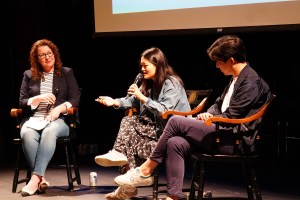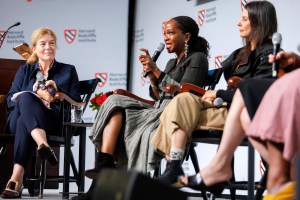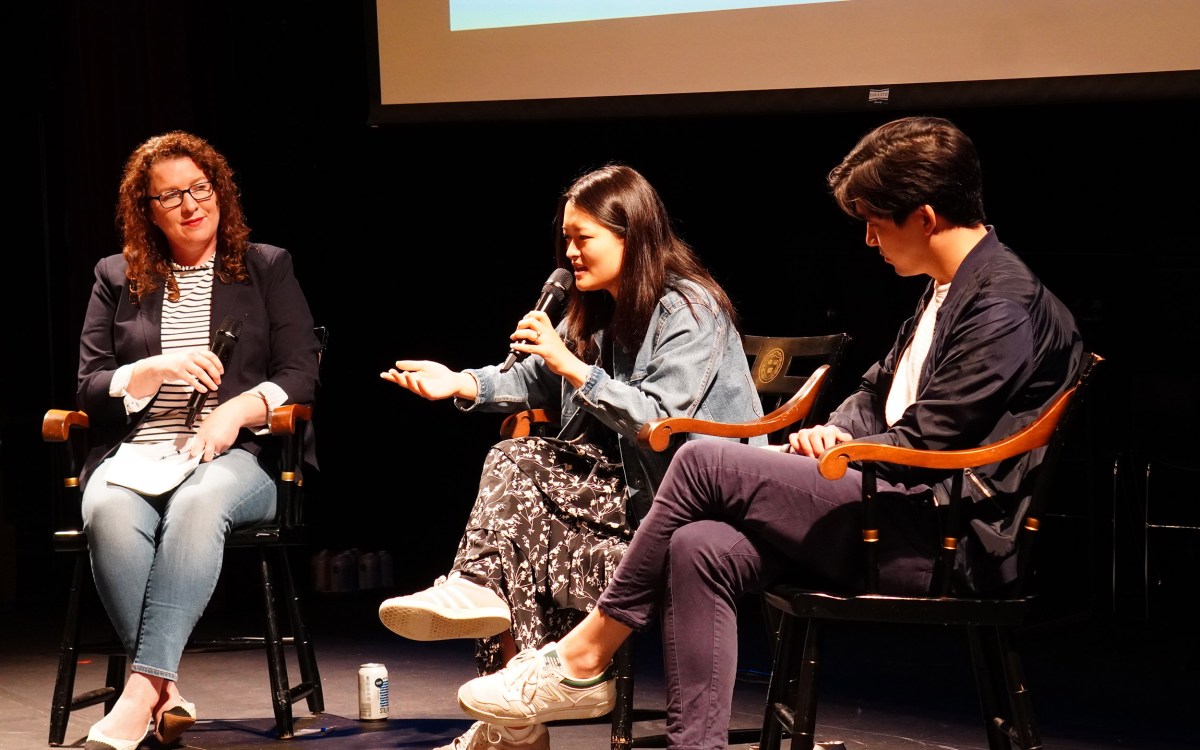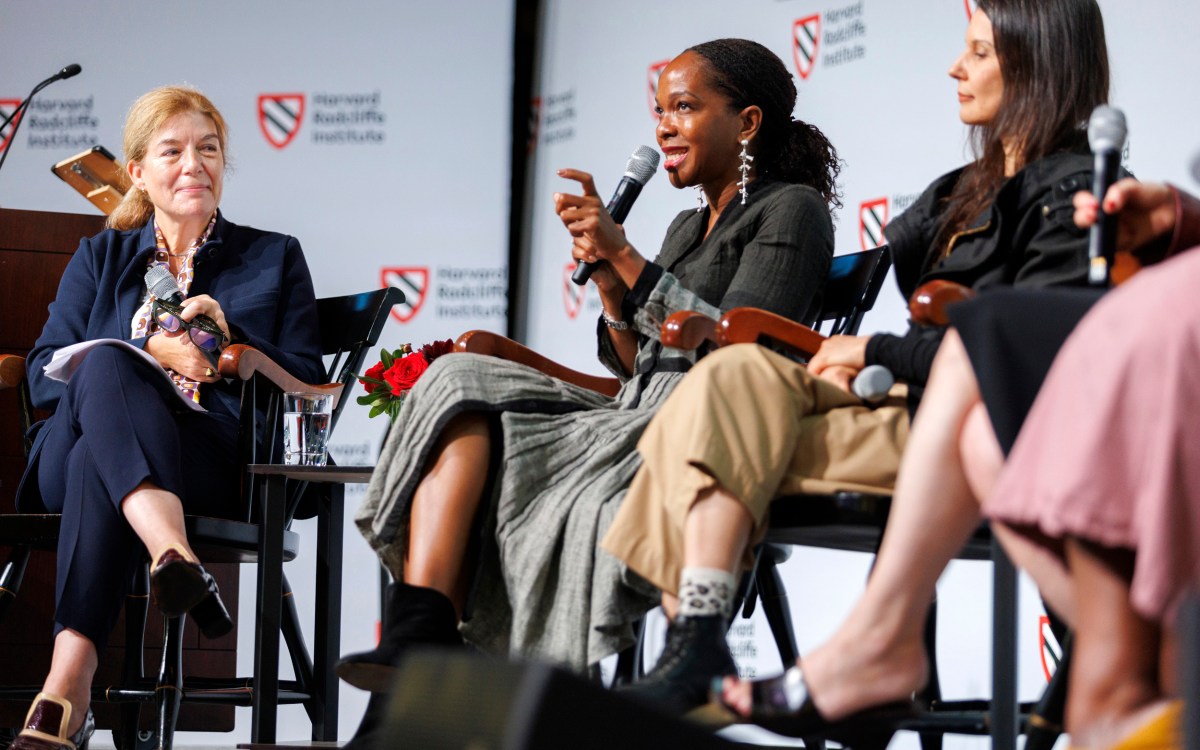
Illustration by Judy Blomquist/Harvard Staff
City of poets
Eight students pick a spot in Cambridge with historical, personal meaning and read an original work
A spirit moves, John Harvard walks the yard,
The books stand open and the gates unbarred
— Seamus Heaney, “Villanelle for an Anniversary”
Cambridge and poetry have a special relationship. On seemingly every corner of the city, such poets as Elizabeth Bishop, Countee Cullen, T.S. Eliot — the list goes on and on — have worked, played, and penned verse. None of this is lost on the Harvard student poets who work, play, and write in some of those same spaces.
For National Poetry Month, we asked eight student poets to select a site of historic significance that holds personal resonance and read an original work.
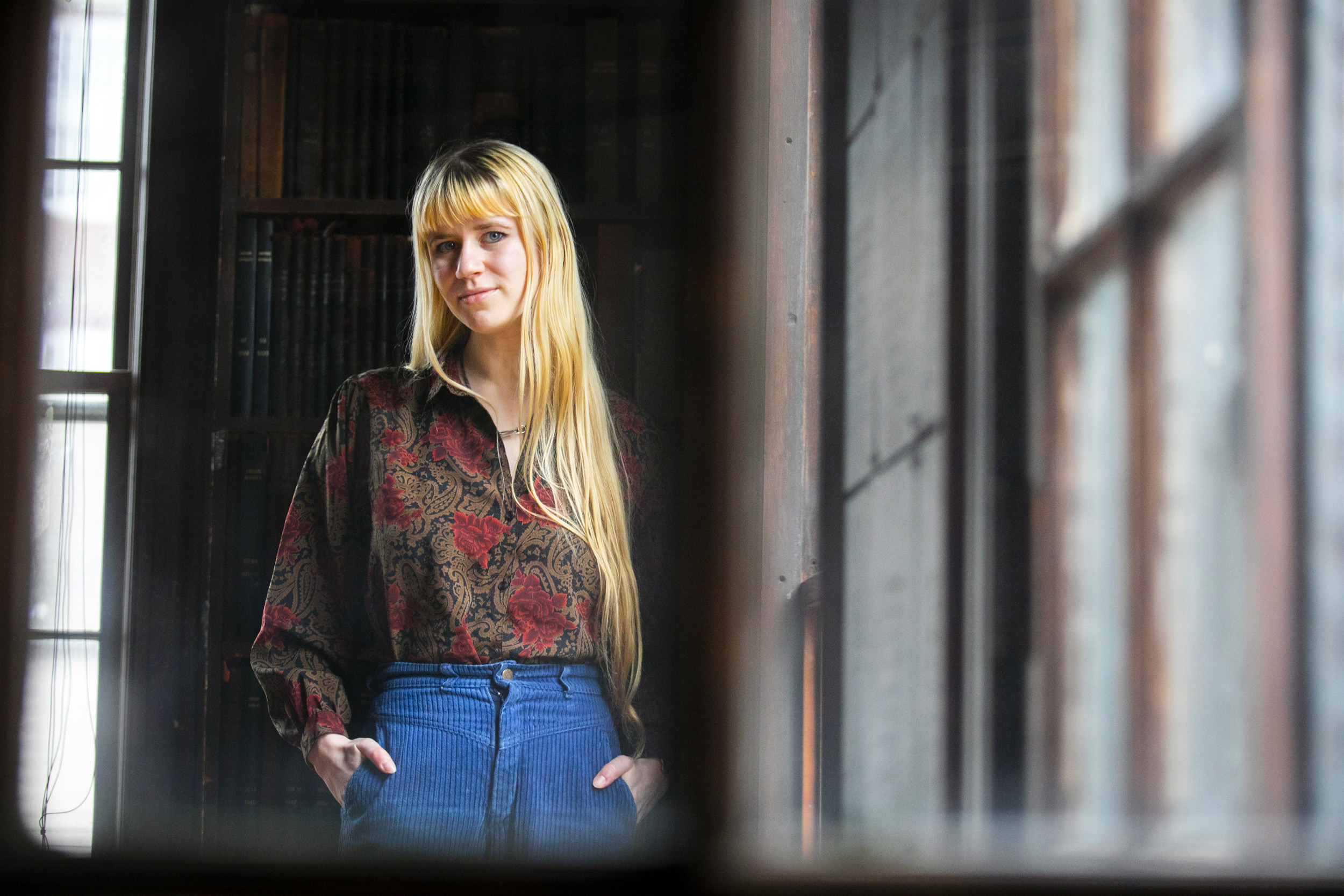
Photographs by Stephanie Mitchell/Harvard Staff Photographer
Marie Ungar ’23
The Harvard Advocate (est. 1866), 21 South St.
Marie Ungar attended a creative writing summer camp in high school and had been exposed to some contemporary poets — Richard Siken, Ocean Vuong, Ada Limon, Maggie Nelson.
But it wasn’t until her first year at Harvard that she gained a true appreciation of poetry, she said. She largely credits her time at the Harvard Advocate.
Tucked away on a small street alongside Kirkland House, the Advocate, established in 1866, is the oldest continuously published collegiate literary magazine in the country and has included such editors and contributors as Jack Kerouac, Frank O’Hara, Adrienne Rich, and Wallace Stevens.
While serving on the Advocate’s poetry board and as its poetry editor, Ungar evolved as a writer, met fellow poets and mentors who inspired her, and delighted in the opportunity “to nerd out about poems” with colleagues. Poetry, she said, is “a way of making meaning of the world.”
Ungar contributes a poem from her creative thesis about a moment spent with her friend Polina during the pandemic. It was their final day together after a summer in upstate New York before returning home.
I Am Always Getting Myself into Such Fixes
For Polina
The sky was bluer than any blue
you’ve ever thought you’ve seen in me.
We walked to the lake’s edge
and looked
at all the blue.
Against such a background,
everything gives way
so easily.
The trees tipped their branches
toward the shallows.
The birds submitted their reflections
to the water’s whim.
You skipped stones like small offerings
while I tried to take your picture, but the landscape
wouldn’t let go.
I wanted to hold it so badly,
and it took me instead.
I am always getting myself
into such fixes.
Leaving scattered parts
as necessary.
I imagine when Isis gathered the pieces
of Osiris’s body, she understood
what she was taking
away. She knew blue,
after all, and what it’s like
to live there. By the time I die,
there will be nothing left of me.
Poem first published in “Lake Effect.”
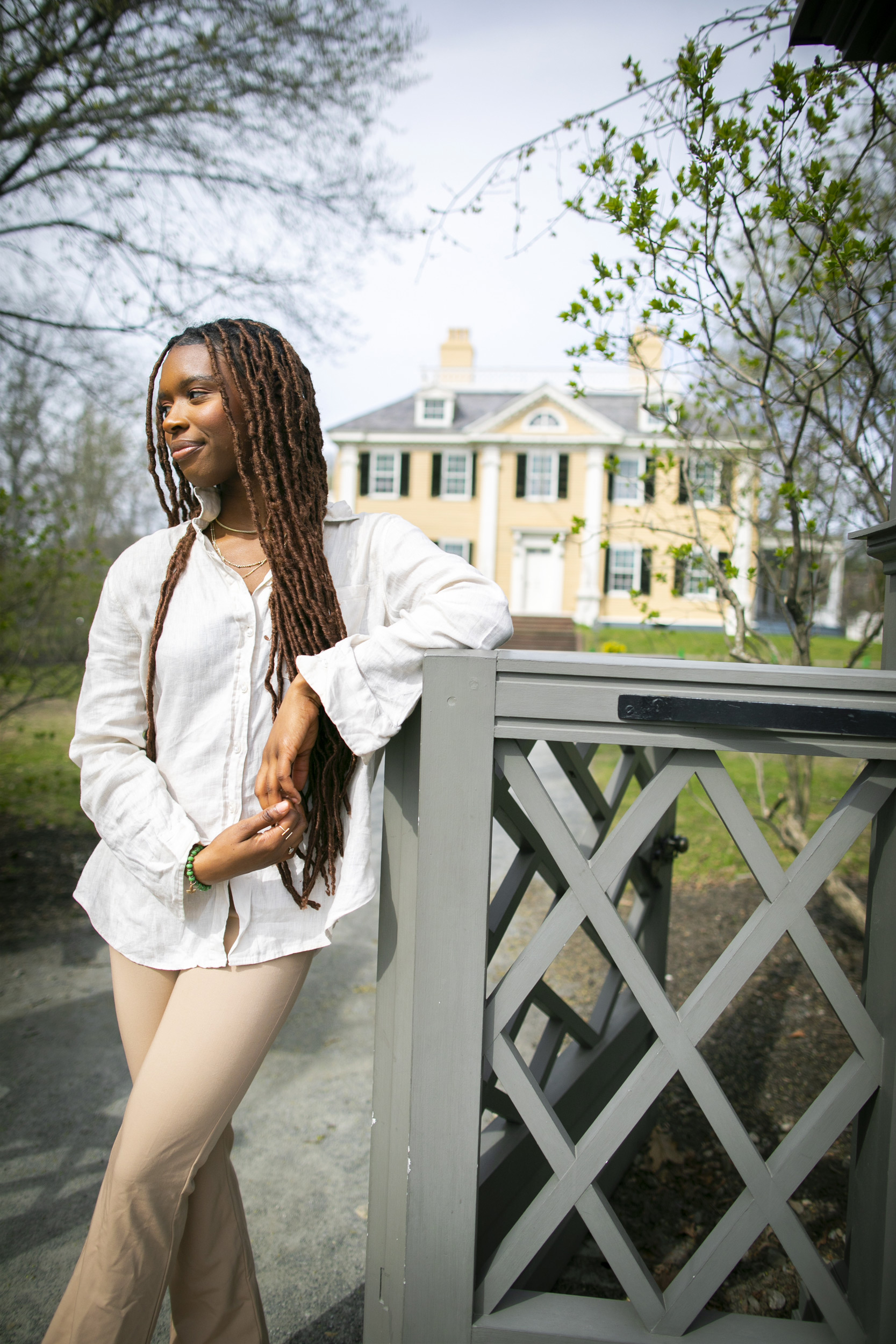
Mia Word ’24
Phillis Wheatley (1753-1784), 105 Brattle St.
“I chose Longfellow House because of the connection it has to Phillis Wheatley,” said Mia Word.
Wheatley was born in West Africa in 1753 and sold into slavery in 1761. In 1773, she became the first African American woman to have writings published with “Poems on Various Subjects.” Emancipated shortly after the book’s printing, Wheatley was invited to what is now Longfellow House in 1776 to meet the future president Gen. George Washington at his Cambridge headquarters.
“I recently read a piece by her in one of my classes this semester, where she’s criticizing a college in Cambridge, for not allowing her to attend. I chose this location as an homage to her now that Black women are at Harvard,” Word said.
Word’s favorite poets include Langston Hughes, Lucille Clifton, Jericho Brown, and Audre Lorde. Next year, the English concentrator’s creative thesis will center on women’s voices from her home, the Mississippi Delta.
“Poetry is therapy for me in a way,” said Word. “I’ve always been a little bit shy, and it’s given me an ability to say things that I wouldn’t normally say, and given me an avenue to be someone on the page that I’m not in person.”
Word’s poem “Sunset” is inspired by Jericho Brown and his duplex form.
Sunset
A “Duplex” inspired by Jericho Brown
My ancestors live with me at home
I reap their protection and suffering
I use their protection when suffering
Singing the same old songs
Same old songs to fight the same devil.
We made art from our sorrow
They made a new art form: our sorrow
Offset the lost bodies harder to use now
Lost her body it’s harder to use now
Since then, she feared the lamp shaded terrors of night time
Since then, grandma feared us not home in night time
Fair skin can whisper dark secrets on and on
On and on I hear the whispers of dark secrets:
My ancestors who live with me at home.

William Lohier ’23
W.E.B. Du Bois (1868-1963), 20 Flagg St.
William Lohier stands in front of 20 Flagg St., where W.E.B. Du Bois rented a corner room while earning his second B.A. at Harvard in 1888-90 before becoming the first African American to receive a doctorate from the University.
“It means a lot,” Lohier said, “to know that despite the historical distance we can still inhabit and bring alive the same spaces.”
About poetry, Lohier said, “It’s a way I express myself and understand my life. It’s such a broad and capacious thing that helps us gesture toward things we know about ourselves that language can’t always grasp immediately.”
It’s also “deeply about community,” said Lohier. “This space has really granted me a sense of the people that came before me. I feel authorized to be in conversation with particularly Black poets that have lived here, worked here, come through here, and shared their work.”
Lohier shares a poem about spring that cites a poem by Robert Hayden and nods to Evie Shockley. “There’s such a long tradition of Black poetry in this country. I feel like I’m always trying to read more and discover more.”
befriend
there are things even a man and his dog can’t capture :: signs wonders miracles dick :: clock out work early tomorrow, in fact, don’t clock in at all. skip stones long the river so hard and fast they take out ships and scoop nymphs from the shallows to grow and suck your fingers dry :: spring arrives before you recognize its face and wonder how you missed the bloom, shoot, hard red-green bud. shot flower bloody rhizome underground can’t-catchery :: i ran for twenty years and on my twenty first birthday put my foot down, stomped the wet ground, said shoot to find me they have to fastrack 7670 days i woke up and made it back to sleep, that’s twenty one times i made it through winter, and twenty one times goddam it’s spring already :: there are things even a school can’t teach :: how to hold on to the greenness of your mind, how to feed your children what is good, mornings bloomed dandelion bright, picked easy
each tunnel vision mission movering :: i almost thought i could fly :: when i reached out my hands i felt other hands, reaching, and we all linked hands and plowed the soil from one end to the other :: coulter flip shift and mold :: i couldn’t see behind me but from the feel of it i knew the new soil’d grow good.
after Evie Shockley

Imani Davis, Ph.D. ’26
Countee Cullen (1903-1946), 413 Broadway
“I picked 413 Broadway because I wanted to see where Countee used to live and have his secret affairs,” said Imani Davis.
Countee Cullen, who would become a mentor to James Baldwin, lived at this address while pursuing his master’s degree in the 1920s. When Cullen married W.E.B. Du Bois’ daughter, it was the wedding of the year, said Davis. “Come to find out, like many other members of the Harlem Renaissance, Cullen liked boys. It was a messy divorce. … I love drama. I live for drama. It comes through in my work.”
Calling poetry “my whole life” and “a vehicle for revelation,” Davis said, “I’ve been writing poems since the first time I fell in love at 12 years old. … It’s a way for me to feel closer to people, people in my life, and even strangers.”
The Ph.D. candidate in American studies expressed gratitude for mentorship of Professors Stephanie Burt and Tracy K. Smith. “I’ve become more sure of what my voice sounds like.”
Davis reads “Golden Shovelet,” named after an original hybrid form containing features of both a golden shovel and a sonnet.
Golden Shovelet* Sheltered-in-Place with Animal Crossing Log-Out Text and OCD
“Ready to wrap things up for now?” —Animal Crossing: New Horizons
Despite the plans you’ve tended like infants, for this, you aren’t ready. Without the evergreen prey of the weekday, your brain turns instead to -wards its owner, sick gentleweapon that it is. You spend weeks wilting: wrap yourself corpselike in a gurgle of gray sweats, refuse the shitty prophecy of Things Going Back To Normal Soon. You know your country. So you give up on the god-given dawn, turn the TV on, and do the american thing: for- get. Bewitched by pixels, you stink of lonely, but Nintendo don’t mind. Now
this is a life worth the precise affections of your eye. Doubled onscreen, you ready
your automated heaven for no one’s visit, chat with handfuls of code designed to
love you back. Every lily is accounted for, every gift assigned correctly to its wrap.
It’s months before diagnosis. You feed the greedy groundhog in your head the things
it demands, tunnel into giddy digital until every window inside you fogs up.
You not playing. You need this routine. Still, you act like the tasks aren’t longed for
in a silly effort to save face. When Tom Nook calls for you, you fondly fume: What now?
*A hybrid nonce form, the golden shovelet contains the signature features of both the golden shovel and the sonnet.
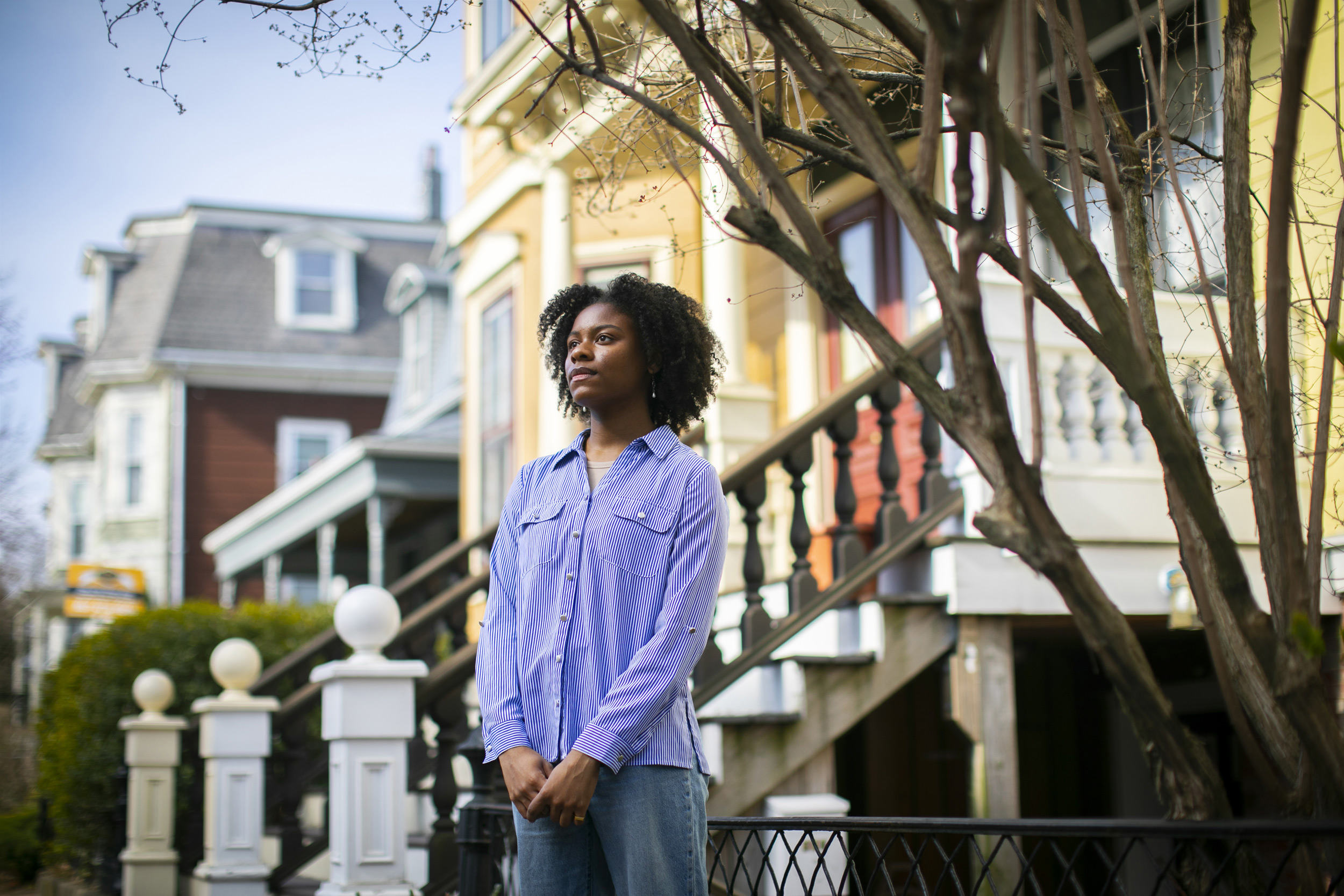
Joi Gonzales ’25
The Dark Room Collective (1988-late 1990s), 31 Inman St.
Taking a poetry class sophomore year with Tracy K. Smith was “my childhood dreams coming true,” said Joi Gonzales, a concentrator in molecular and cellular biology.
“I feel like I really was able to find my voice in poetry,” said Gonzales. That confidence, she said, allowed her to better express ideas about science, biology, and social justice.
Gonzales selected 31 Inman St., where the Dark Room Collective was founded in 1988 by Thomas Sayers Ellis and Sharan Strange. She said the collective carved out a “space for not only themselves” but “set a precedent for Black creators at Harvard … to have spaces for themselves.”
Gonzales reads a poem that comments on “the abstractness or borderlessness of Blackness.”
In This City We are All Mythical Things, Metaphors, The Abstract
Start with an ekphrastic where the World Cup is framed
by a small tv on the floor of a living room.
There is a family watching, cheering
for a country without a flag.
Their country is not a country
and is made of many nations.
The soil of their nation is a womb;
the sky of their nation only exists in the air of lungs.
The soil is made of beating hearts that all stop when one stops.
I tell Wisdom my gossip
I let The Sea braid my hair.
Lust takes me to the beauty supply store and
on the way she tells me of all of the songs she’s inspired.
She tells me they call for her and
when they take her,
they try to break her
in a visceral rage
and end up hurting themselves.
When we get back,
Ol’ Faithful is talking about how
she ate two men whole and
They thanked her for
her revelation on consumerism.
I was just hungry.
This country has no bound / no border.
This country,
my country,
knows of ash and resurrection.
of doubt and deception
yet, this country knows
what it means
to win and no,
that does not always
mean gold.
I saw [ ] cry
and they used her tears
to write theories on [ ].
Then she went right back
to cleaning those cast iron pots.
And the circular motion she made with the sponge
represented the coils of her hair
and the coils of her hair represented the milky way.
And her tears represented generations of sorrow.
(Really she was just sad she didn’t have a team in the World Cup.)
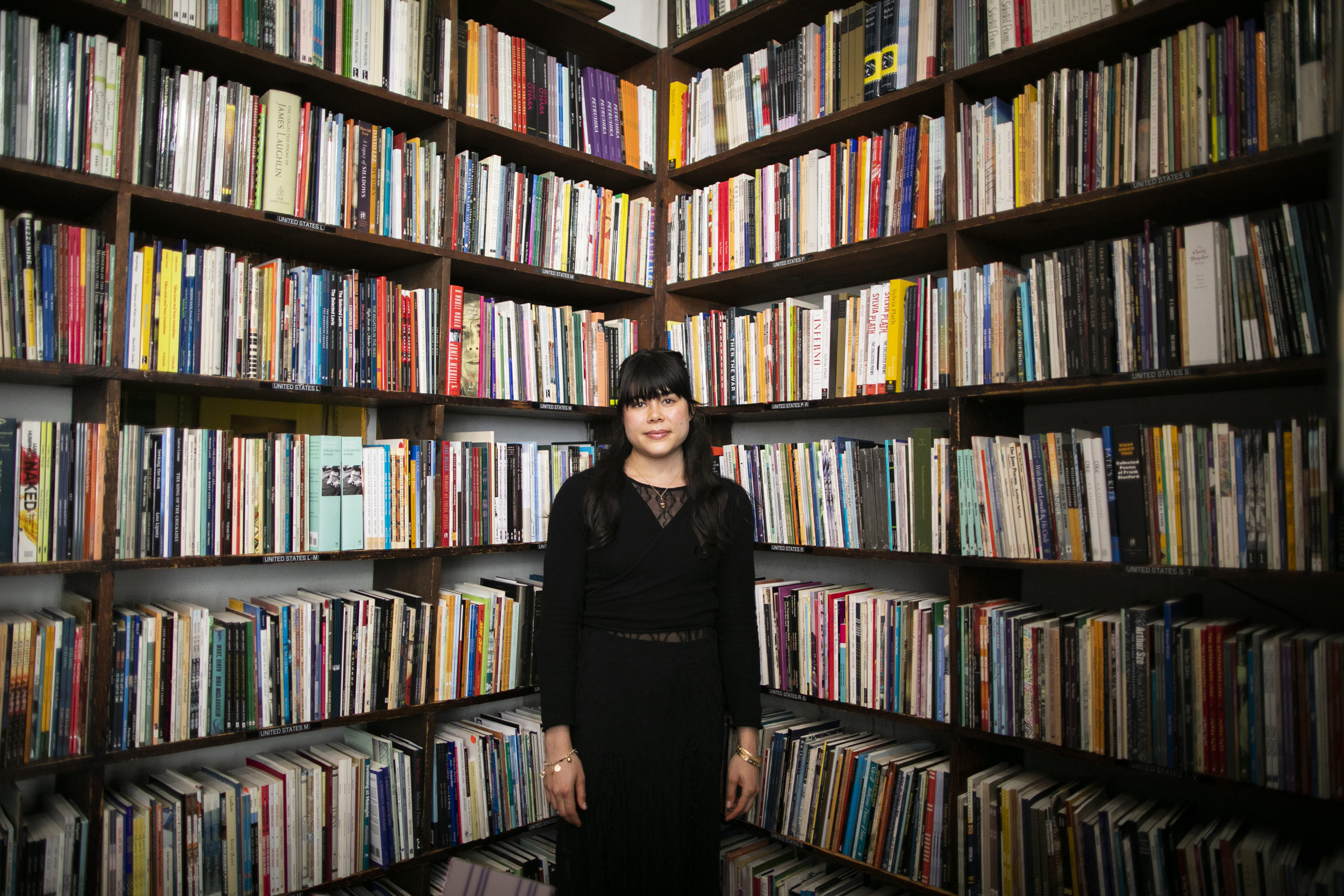
Lana Reeves ’23
Grolier Poetry Book Shop (1927-), 6 Plympton St.
For Lana Reeves, Grolier Poetry Book Shop has “taken on a mythic proportion.” It is the oldest poetry bookstore in the U.S., founded in 1927, with floor-to-ceiling shelves filled with books and photographs on display of Helen Vendler, Seamus Heaney, and Ifeanyi Menkiti, the late owner whose family carries on the tradition of the historic institution.
Poetry, for Reeves, is about music and rhythm — “it feels like an experience in a bodily sense” — and its purpose is “to serve the imaginary space.” Her work speaks of decolonization and re-envisioning sovereignty. “It is difficult in other modes of writing … to envision a future without those structures.” For Reeves, poetry serves as “a way to imagine a more just future.”
For her senior thesis, Reeves considers Hawaii, where she’s from, as a collective voice including people, plants, and animals “and how might these voices contribute to shaping a decolonial future.” In the following poem, she speaks as the kalo, a taro native to Hawaii, in the wetland lo’i, imagining what advice it might give.
What I Pull Up
We find each other getting back
to the nature of things. In the bend
and pinch. Where your fingers become
a basket for ancient, infinite
traces. Where vision leaps through time,
untethered. I am the stump of something—
How many times have you buried me
only for me to bob to the surface?
Root prism. This patch of muddled prayer
moves through us, and I have seen
the good its medicine can do.
How else do you imagine
our bodies allowed each other? The body
is a whole water system. The body
waters the body. These bodies that are
systems of bodies. And you—
your blood, hair, skin, and bones,
your unwillingness to sacrifice your happiness—
I can only hope to become again. Don’t wait—
I do not wander into the mouth,
but must be wrenched into being
and held there. Root grip. Tender
prison. I hold you, right now
in more ways than you can ever know.
Spoken as the kalo (taro), in a wetland lo‘i. Indigenous plant of sustenance which grows in deep mud and water, and which can regenerate infinitely by re-planting the stump.
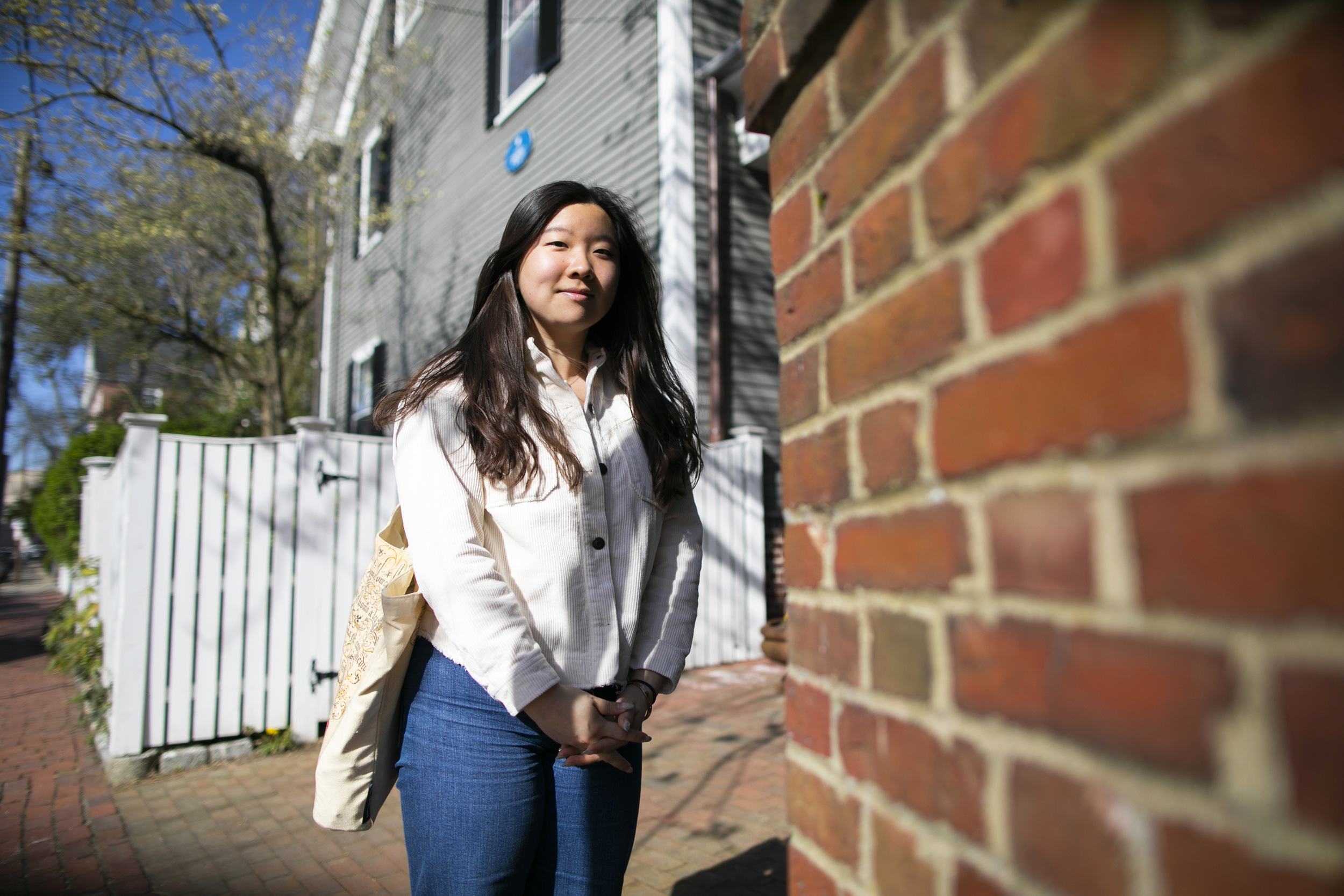
Isabella Cho ’24
T.S. Eliot (1888-1965), 14 Ash St.
“Eliot has always been this figure that I feel myself in very distant orbit to … historically, he’s grounded in this area.”
Isabella Cho stands outside 14 Ash St., where T.S. Eliot lived as a doctoral student in an attic apartment while teaching philosophy in Emerson Hall. “He’s very brooding and magisterial in his language,” said Cho. “There’s something very baroque about his formulations, about the way that he approaches these very heady, conceptual questions about time and endlessness and legacy and remembrance.”
Drawn to poetry from an early age, Cho, an English concentrator, enjoys how simultaneously the craft is “boundless” and “exacting,” “meticulous” and “playful.” Since coming to Harvard, Cho said she has become “not just more inventive with my poetry, but much more ambitious in the scope and content.”
“I’ve always viewed myself as someone who was a lover of literature, first and foremost, a reader and a writer, someone who loved to work with and be knee-deep in language.”
Cho shares a poem that explores the visceral experience of visiting the countryside of South Korea, where her parents were raised.
Post-War Topography
these are the mountains, i’m told,
where boys with guns weaved through trees
and prayed for rain. where camphor caught red
silt between roots and the spirits of tigers stirred
in faceless boughs, silver bombers gliding
through canopy. at night, the mountains grow
like stains, lean into the automobiles strewn
over asphalt. in the sky, a commercial plane,
red wound on a pockmarked face. gravel rasps under
my rubber soles. i paw at it: an animal, maw wet
with what’s to come. there’s no truck hulking bovine
in the dark, no moonlit wheel to throw
my gaze at. instead, my hands, oiled from heat,
rushing down for dust: an arc of rubble thrown
into sky. it suspends, luminous, then clatters
to stillness. just pearl air killing
the blue rhythm of stars. crickets weep
and add a skin to silence. above mountains
light cycles through its blistering histories—
i, too, a fist of dust in transit.
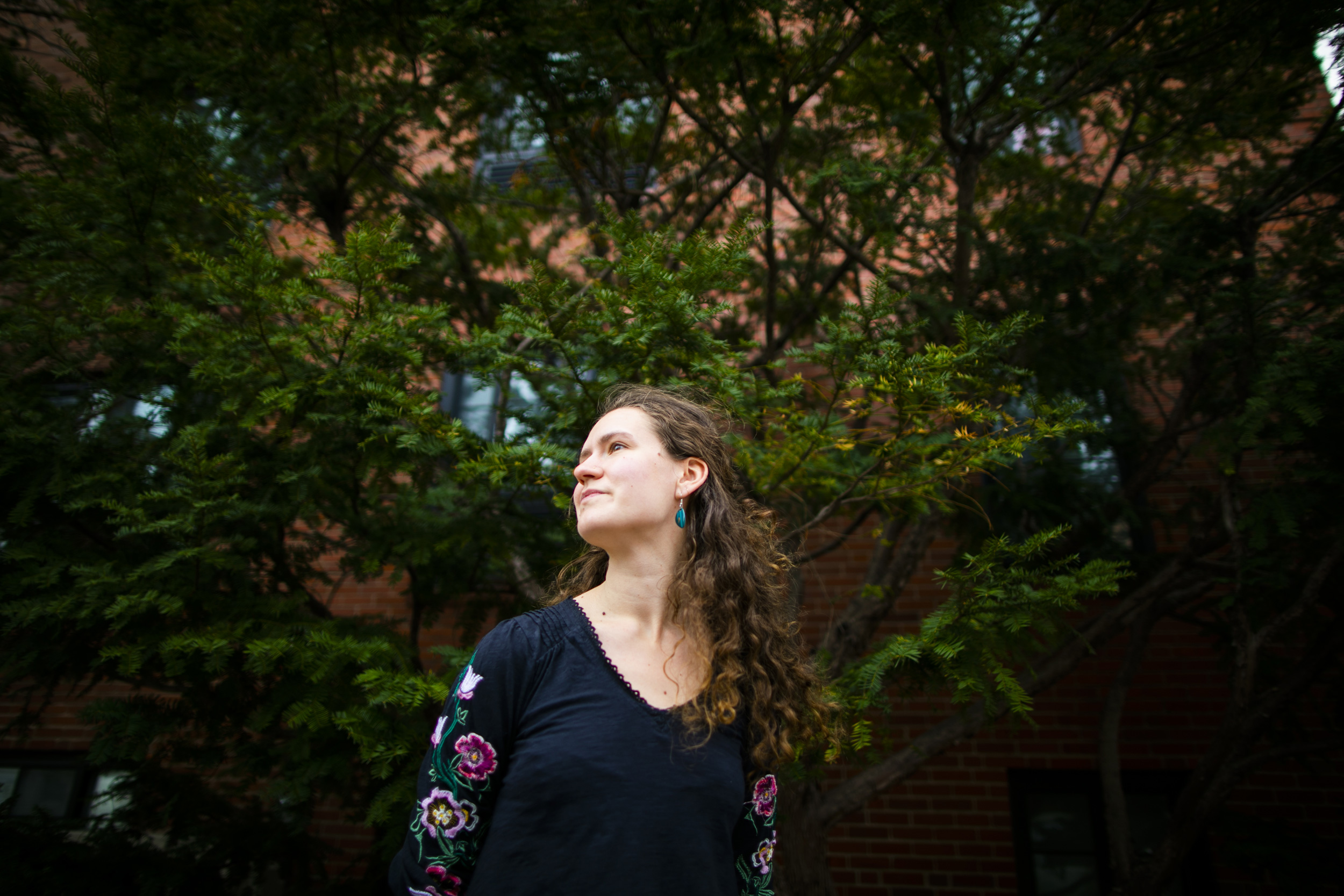
Celia Silver ’24
Elizabeth Bishop (1911-1979), 60 Brattle St.
Celia Silver selected the brick apartment block at 60 Brattle St. where in the early 1970s, Elizabeth Bishop resided in a second-floor apartment while teaching at Harvard. According to Bishop’s friend, the poet Lloyd Schwartz, she wrote most of “Geography III” from this spot overlooking the Loeb Drama Center, Silver said.
“I just love the way Elizabeth Bishop uses language. Her images are so powerful, beautiful, and evocative,” said Silver, adding that her sometimes “weird” and “mysterious” verses are simultaneously accessible and complex.
As an analytic thinker, Silver enjoys the “visceral and magical” properties of poetry. She enjoys being surprised by the writing process. Rather than creating a poem “perfectly crafted to my designs” through writing prompts and form, Silver said she allows it to “take me to places that I didn’t expect it to go.”
Her poem pulls from childhood recollections of swimming and the blurred and layered effects of time and memory.
The Lake
I can hardly remember the lake
at all. The water was blue or
it was black and the night
was black too. My hands blue
in the dark-black night. My hands
soft and still in the soft
and silky lake-light. I wore
only my youth. I kissed his soft
and shivering hands with my lake-water
lips. I was newly bud-breasted and wished hard
for the waters to part like my parents.
My sister just learning to swim to me
and her small hands working so hard
until she fell like the moon onto my breast.
My mamma holding me with waters
in her hands. He held my hand
and all we wore was skin and night.
My youth as new as the shiver of moon
and I was very afraid of the black places
in the blue water. My breaths were hard
and I swam the whole lake or I lay still
on the black water and let my breasts
rise and fall like sister moons waxing
and waning on the black water
in the blue-black night. I can hardly
remember the black water
or that blue-black night but
I remember, flickering on the shore,
fireflies.
